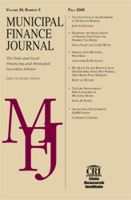State Budgeting in the Aftermath of the Great Recession: A Comparative Perspective
Author: James K. Conant.; Beverly Bunch.; William Duncombe.; Thomas P. Lauth .; Mark Robbins and Bill Simonsen.
Source: Volume 33, Number 02, Summer 2012 , pp.1-33(33)

next article > |return to table of contents
Abstract:
This study examines the budgetary challenges elected officials in Connecticut, Georgia, Illinois, Massachusetts, New York, and Virginia faced during the aftermath (FY 2010, FY 2011, FY 2012) of the Great Recession. The study extends and incorporates published research on budgeting during the Great Recession (FY 2008, FY 2009) in these six states. The authors developed a new framework for the current research project, in which four basic approaches to pursuing budgetary balance are identified. One key finding of the research is that each state had a preferred approach for pursuing budgetary balance during the recession. The legislatures in five of the six states used that preferred approach in their adopted budgets during the first two years of the aftermath (FY 2010, FY 2011). As the fiscal pressures continued, federal stimulus funds disappeared, and newly elected governors insisted on changing strategies, however, legislatures in three of the six states adopted new approaches to pursuing budgetary balance in their FY 2012 budgets. Contributing authors also include Douglas Snow of Suffolk University and Bruce A. Wallin of Northeastern University. The early version of this research on the six states was presented in papers prepared for the Public Finance and Budgeting Section of the Western Social Science Association’s 53rd Annual Conference, Salt Lake City, Utah, April 15–18, 2011. The current case study material is presented using the authors’ newly designed research format.Keywords: State budgeting, Great Recession, recession aftermath, state finances, state budget deficits, expenditure reduction
Affiliations:
1: George Mason University; 2: University of Illinois-Springfield; 3: Syracuse University; 4: University of Georgia; 5: University of Connecticut.